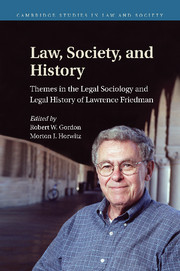Book contents
- Frontmatter
- Contents
- Contributors
- Introduction
- PART I OVERVIEWS AND ASSESSMENTS OF FRIEDMAN'S WORK
- PART II APPLICATIONS OF CONCEPTS, INSIGHTS, AND METHODS IN FRIEDMAN'S WORK
- PART III THE LEGAL PROFESSION
- PART IV LAW AND LARGE AREAS OF SOCIAL LIFE
- Law and Contractual Relations
- 12 The Death of Contract
- Law and the Environment
- Law and Religion
- Law and the Family
- PART V FACTS FROM THE UNDERGROUND: DIGGING LEGAL HISTORY OUT OF THE CELLAR
- PART VI PERSPECTIVES FROM OTHER CONCEPTUAL WORLDS
- Index
- Titles in the series
- References
12 - The Death of Contract
Dodos and Unicorns or Sleeping Rattlesnakes?
Published online by Cambridge University Press: 07 October 2011
- Frontmatter
- Contents
- Contributors
- Introduction
- PART I OVERVIEWS AND ASSESSMENTS OF FRIEDMAN'S WORK
- PART II APPLICATIONS OF CONCEPTS, INSIGHTS, AND METHODS IN FRIEDMAN'S WORK
- PART III THE LEGAL PROFESSION
- PART IV LAW AND LARGE AREAS OF SOCIAL LIFE
- Law and Contractual Relations
- 12 The Death of Contract
- Law and the Environment
- Law and Religion
- Law and the Family
- PART V FACTS FROM THE UNDERGROUND: DIGGING LEGAL HISTORY OUT OF THE CELLAR
- PART VI PERSPECTIVES FROM OTHER CONCEPTUAL WORLDS
- Index
- Titles in the series
- References
Summary
Just because we are amazed by Beethoven's Ninth Symphony, we should not overlook the charm of his First. In something of the same spirit, I have been charged with commenting on Lawrence Friedman's first book, Contract Law in America, which was published in 1965. Friedman now has composed many more “symphonies” than even Beethoven since this first effort, but it is instructive to turn back to the beginning.
In the interest of full disclosure, I must note that I am not a neutral detached observer. I am thanked in the preface of Contract Law in America, and two years after its publication we mixed some of the ideas in Friedman's book with some of mine and made a presentation at the Association of American Law Schools annual meeting. Furthermore, one of my scholarly roles seems to be writing favorable blurbs for the back of jackets for Friedman's books, and the Friedman and Macaulay families have been close friends for more than forty-five years. Indeed, I can point to places where ideas from Contract Law in America have influenced my work. Nonetheless, even an unbiased observer should conclude that the book has had some real influence in the contracts world, and it stands up very well after forty-five years.
In Contract Law in America, Friedman looks at the contracts opinions of the Supreme Court of Wisconsin for three periods: (1) the organization of the Wisconsin Territory to the Civil War (1836–61); (2) the Progressive era in the first two decades of the twentieth century (1905–15); and (3) a time ten years after World War II (1955–58).
- Type
- Chapter
- Information
- Law, Society, and HistoryThemes in the Legal Sociology and Legal History of Lawrence M. Friedman, pp. 193 - 208Publisher: Cambridge University PressPrint publication year: 2011
References
- 1
- Cited by

